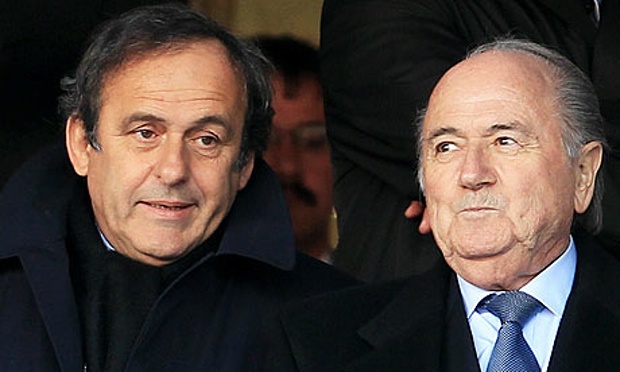ZURICH, (Reuters) – FIFA President Sepp Blatter and European soccer boss Michel Platini were both banned from soccer for eight years today for ethics violations, leaving the global game leaderless as it struggles with a swirl of corruption cases.
The pair, who were also fined, had been suspended in October while an investigation was carried out into a 2 million Swiss franc ($2.02 million) payment that soccer’s global governing body made to Platini in 2011, with Blatter’s approval.
The decision means that Blatter’s 17 years at the helm of world soccer will end in disgrace, and spells the end of Platini’s hopes of replacing the 79-year-old in a presidential election in February.
The Swiss, who spent four decades at FIFA, came out swinging, holding a news conference to tell reporters that he was sorry only that the president of FIFA was being treated as a “punching ball”.
“I will fight for me and I will fight for FIFA,” said Blatter, unshaven and with a sticking plaster on his cheek, but defiant.
He said FIFA’s Ethics Committee had no right to relieve him of his duties and that he would challenge the decision in FIFA’s Appeals Committee and, if necessary, the Court of Arbitration for Sport in Lausanne, Switzerland, and in the Swiss courts.
The committee said it had not found evidence that the payment, made at a time when Blatter was seeking re-election, constituted a bribe, which meant the men were spared potential lifetime bans.
VERBAL AGREEMENT

But it said the transaction had nevertheless lacked transparency and presented a conflict of interest. Platini, like Blatter, has denied wrongdoing.
The ethics inquiry began after the Swiss attorney general decided to open criminal proceedings against Blatter over the payment to Platini. The office is also investigating FIFA’s award of the 2018 and 2022 World Cup finals to Russia and Qatar.
Blatter and Platini argued that the payment followed from a verbal agreement they made in 1998, and concerned work that Platini did for FIFA between 1998 and 2002.
“The evidence available to the adjudicatory chamber in the present case was not sufficient to establish, to the extent required, that Mr Blatter sought the execution or omission of an official act from Mr Platini,” said a statement, referring to the ‘bribery and corruption’ section of the code.
But the committee’s adjudicatory chamber did find that the payment had been “without a legal basis” and a breach of regulations governing gifts and other benefits.
It said Blatter “found himself in a situation of conflict of interest, despite which he continued to perform his related duties, failing to disclose said situation and the existence of personal interests linked to his prospective activities”.
“By failing to place FIFA’s interests first and abstain from doing anything which could be contrary to FIFA’s interests, Mr Blatter violated his fiduciary duty to FIFA,” it added.
ABUSE OF OFFICE
The chamber concluded that Blatter’s actions ultimately demonstrated “an abusive execution of his position as President of FIFA”.
It also said Platini’s argument that there had been an oral agreement for the payment had not been convincing, and that he, too, had abused his position as a FIFA vice-president and Executive Committee member.
“Mr Platini failed to act with complete credibility and integrity, showing unawareness of the importance of his duties and concomitant obligations and responsibilities,” it said.
Blatter was fined 50,000 Swiss francs and Platini, who boycotted the ethics committee hearing as unfair, 80,000.
UEFA said it was disappointed with the ruling and “supports Michel Platini’s right to a due process and the opportunity to clear his name”.
Until his suspension, Platini had been the frontrunner to succeed Blatter at the top of world soccer. Following Monday’s ruling, the British bookmaker William Hill made Sheikh Salman bin Ebrahim al Khalifa, president of the Asian Football Confederation, the 6-5 favourite, followed by Jordan’s Prince Ali al Hussein on 13-8 and UEFA General Secretary Gianni Infantino, of Switzerland, on 5-2.
In the United States, prosecutors have indicted 27 current or former soccer officials, including eight former FIFA Executive Committee members and the current heads of both the North and South American federations, over allegations that they ran bribery schemes connected to the sale of television rights for soccer competitions. Twelve people and two sports marketing companies have been convicted. ($1 = 0.9925 Swiss francs)
